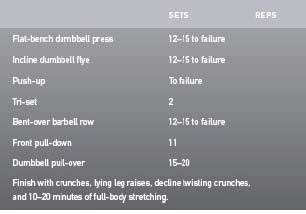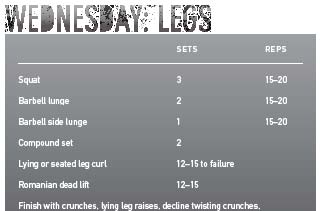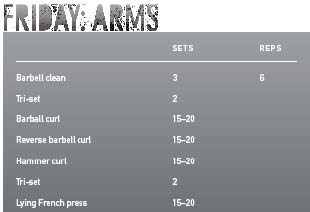Iceman (20 page)
Authors: Chuck Liddell

I wasn't sure why. I hadn't tapped out and wasn't unconscious. Then I realized, Hack had thrown in the towel. From his point of view, I was getting pummeled, wasn't improving my position, and had nothing left. Even if I had gotten out of the trouble I was in, the result may have been the same.
Looking back to before the fight began, I had already made a fatal mistake. I should never have worked out at the camp in Vegas instead of The Pit. It might have felt as if I were getting a good workout, but it couldn't compare to what I'd have been doing if John was kicking my ass every day. Of course, I didn't know this until it was too late. I wasn't in the right shape and I pretty much ran out of gas.
But something good did come out of the loss. I think seeing me lose gave Tito some confidence that I wasn't so tough after all. Maybe he thought he could beat me because, by the end of the year, he had finally agreed to fight me.
IT'S NOT ABOUT STRENGTH, IT'S ABOUT STRENGTH OVER A LONG TIME
A
T LAST, IT WAS ON. THAT'S EVEN WHAT THEY WERE
calling the card that Tito and I were set to headline in April of 2004, UFC 47: It's On. At this point, I didn't care that he no longer held the light heavyweight title. I've always fought for more than titles, anyway. And I didn't care that he was slated to make more just for fightingâ$125,000 (plus a $50,000 win bonus)âthan I would make for fighting and winning ($50,000 for each). And I didn't care if it was because my stature was diminished in his eyes after I'd lost to Rampage. I didn't need him to respect me or fear me. In fact, both of those things might have got in the way of setting this thing up. If he thought I was a chump and that got him into the cage, fine by me. After nearly two years of his bullshit; after nearly two years of his ducking me; after nearly two years of his claiming we're too good of friends to fight and that I was stabbing him in the back just because I was willing to get in the cage with him, we were finally going to settle it. The time for talking was over. At least I thought it was.
One of the great things about the UFC bosses is how well they create drama around a fight. The postfight interviews are usually as full of fury and emotion as the fights themselves. It's not just the fighters doing the talking either. It may looked staged, but at times UFC fighters with bouts coming up will jump into the cage, grab the microphone, and start talking smack about their opponent, firing up the crowd, themselves, and those watching at home. That's part of the culture Dana has created, for the better. We're fucking fighters, and if we're moved by the passion of a fight to get into the cage in street clothes and start talking about beating the crap out of someone, we can do it. It's good for us, it's good for the card, and it's good for the UFC.
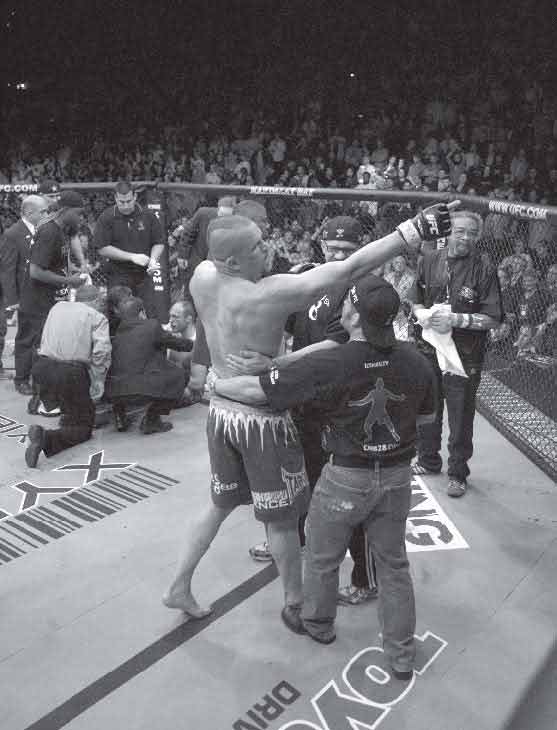
I love pointing at the crowd after winning a fight and hearing them get all fired up. The UFC is all about the fans.
Of course, plenty of other times postfight confrontations are staged, or at least planned, as with me and Tito after UFC 46 on January 31, 2004. We were both in Vegas to watch Randy put his light heavyweight title on the line against Vitor. (To give you an idea of how much the Randy fight had cost meâand how much I lost by fighting for the interim title instead of the real title against TitoâI was making $80,000 less in guaranteed money than Vitor was to be paid for fighting Randy. I've never been about the money as a fighter, but if I were looking for one more excuse to want to bash Tito's head in, there it was.)
The fight didn't last long, with Vitor winning by a TKO after he caught Randy above his eye and Randy couldn't stop bleeding. The doctor called it. Afterward, Joe Rogan called me and Tito into the Octagon. As soon as Tito walked out, people started booing. The guy had not only lost his title but, by avoiding a fight with me, had lost the respect of a lot of MMA fans. Meanwhile, I was still an underdog, the workingman's fighter. I hadn't been given my title shot yet. And now that Vitor had won, Randy would be in line for a rematch before I'd get my next chance. I honestly think people were rooting for me as much because of the way Tito acted and because he had shafted me as they were because they liked my fighting style. So while they booed him, I got some cheers.
When we got to the center of the cage, Joe said to Tito, “There's been a lot of talk, a lot of emotion. Tito, tell us what is going to happen on April second.”
Tito answered, “Iceman, what's up? With your belly it looks more like Snowman. I can't wait for April second. This fight is finally going to happen. I am going to give you a beating. Let the beating begin.”
Then Joe looked at me and said, “Chuck, what do you have to say?”
“This guy has been talking crap for a long time,” I said. “He's the one who has been talking crap. He stepped in the ring after I beat Vitor and started saying he was going to kick my butt. Well, he better have been practicing his wrestling because I know he is not man enough to stand in the middle of this ring and strike with me. And if he is, I'll announce to everyone here, if he is man enough to stand in the middle of this ring and strike with me, I'll knock his ass out. And he knows it.” Then I pointed right at him. The crowd went nuts. Tito tried to respond but was drowned out by the cheering and the booing. Finally he just walked away and flashed the crowd the finger as he left the cage. The whole confrontation lasted nearly as long as the Couture-Vitor fight. And it may have been more exciting. Even though no title would be on the line, there wasn't a more anticipated fight in the UFC at that moment than Tito and me.
For most fights I'm lucky if I can get eight weeks of training in. But this one was scheduled so far in advance, I had ten to twelve weeks to get ready. My training had more of a slow build, which I liked on two levels: I knew I'd be in peak physical condition, but I also knew I'd have so much pent-up energy and readiness to fight that it wouldn't take long to finish Tito off.
I wasn't in great shape for Rampage and I wasn't in great shape for Randy. So, more than ever, I was committed to my cardio for Tito. I felt we were equal wrestlers and he might be better with submission moves, but I had the advantage standing up and in punching power. That meant I needed my wind. If I can bench four hundred pounds and squat six hundred, but I can't perform aerobic exercise at peak physical levels for half an hour, I won't last two minutes in the ring. Plenty of cut, muscle-on-muscle guys have stepped into the cage, and if they don't land a knockout punch early in the fight, it's over for them. They were so committed to power they didn't see past the initial rush of adrenaline, when a fight settles down and your body feels as if it's carrying double your weight. Your arms feel heavy, your legs feel heavy, and it's hard to breathe. And that's just when you're dancing. Trying to evade a punch or even taking a punch can bring on the fatigue even faster. Just breathing can be a challenge in this scenario. It sucks to get to that point in a fight, and it's immediately a reminder that you've got to train harder next time, because you never want to feel that way again. I've read about players in the NFL who practice a yoga technique called body armor. It's when they take deep and slow breaths, all while their instructor is hitting them in the stomach and the side with a bamboo pole. The idea is to teach yourself how to regulate your breathing even while being attacked. Not easy.
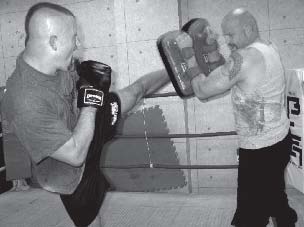
I always push myself to the limit when training.
Without good cardio, every fighter will lose most of his strengthâas much as 80 percent of itâearly in a fight. It's not about strength; it's about strength over a long time. So I did all the things that push my body to its limit. I ran on the beach endlessly, building up my leg strength while struggling to dig out of the sand. They had me running sprints, playing catch with a football, running patterns, then hauling ass back to the guy who was passing me the ball. I need help keeping conditioning drills fun. I really hate straight runningânot because of the pain, but because it is so boring. I did the wall ball, where I take a 125-pound medicine ball, throw it against a wooden beam, and make it bounce back at least three feet. It's hard enough picking up the medicine ball. But to make it bounce back is brutal. Then do it five times. For three sets. With just a minute of rest in between. This built up my shoulders and helped my punching power. I would push a wheelbarrow uphill with two hundred pounds, which helped with my stamina, but going downhill it strengthened my grip and my forearms and my shoulders. I knew Tito would try to take me down, and these muscles are what would help me keep him off me. I did the sledgehammer drill, swinging a sixteen-pound sledgehammer into a tire one hundred times, again to improve or maintain my punching power.
Notice how so many of these drills don't use machines or high-tech weights. This is The Pit way, man. It's hard-core. Nothing in a gym can beat pushing two hundred pounds in a wheelbarrow up a hill. I did push-ups, with my hands in different positions and at different speeds. I shadowboxed, jumped rope, hit the bag. Every day, twice a day, for two hours each session, I pushed myself to the limit.
I didn't ignore lifting weights, either. On the days I wasn't with John, here's what I told
Muscle & Fitness
magazine my workout schedule in the gym looked like:
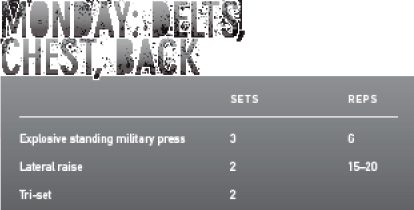
Â
